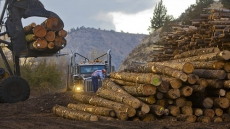SMITHERS, B.C. - The British Columbia government and First Nations hereditary chiefs say they have failed to reach an agreement on a peaceful resolution over the enforcement of an injunction in northwestern B.C.
Wet'suwet'en hereditary chiefs proposed seven days of discussions to de-escalate the dispute over the construction of the Coastal GasLink pipeline through the First Nation's traditional territory near Houston.
Chief Woos, who also goes by Frank Alec, says in a statement that two days of talks have concluded without progress and he expects enforcement of an injunction in the disputed area to be "imminent."
Fourteen people were arrested last year when RCMP enforced an injunction that allowed pre-construction across Wet'suwet'en territory of the $6.6-billion natural gas pipeline, a key part of the provincially approved $40-billion LNG Canada development.
Alec says hereditary chiefs remain committed to the engagement process and will continue discussions with the B.C. government, something Minister of Indigenous Relations and Reconciliation Scott Fraser confirms.
Fraser says in a statement that even though a successful resolution was not found, everyone "came together in good faith to try to find a way forward" and the province remains open to further dialogue.
"We hope that the paramount need for safety stays the top priority for all parties," Fraser says.
The B.C. Supreme Court granted Coastal GasLink an expanded injunction on Dec. 31 and the Wet'suwet'en hereditary chiefs responded by issuing the company an eviction notice in early January, arguing the company was violating traditional Wet'suwet'en laws.
There has been increasing tension since then, with RCMP saying traps "likely to cause bodily harm" had been found along a forest service road leading to the pipeline construction area.
A RCMP checkpoint limits access to the region although hereditary chiefs maintain they hold sole title to the unceded lands and do not support the pipeline.


